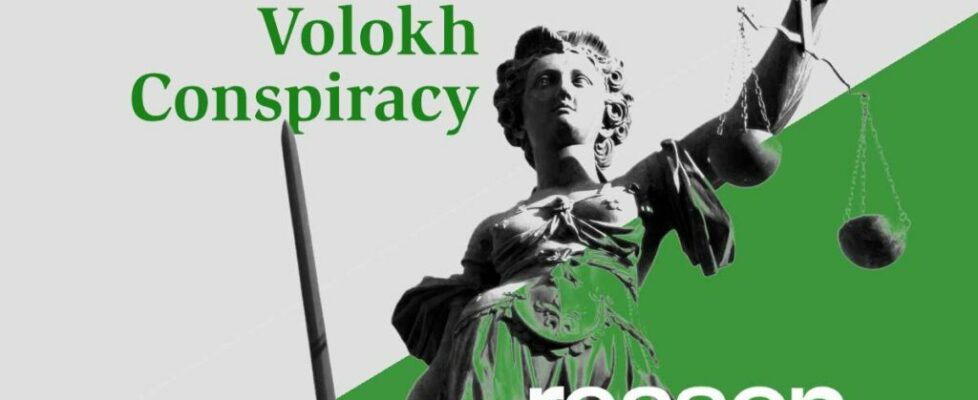Can The Judicial Conference Refer Supreme Court Justices To The Attorney General?
Federal law requires certain officials to submit financial disclosures. And under 28 U.S.C. §13106(a) the Attorney General can bring a civil action if a covered official “knowingly and willfully fails” to file such a report.
Section (b) permits agencies, including the Judicial Conference, to make referrals to the Attorney general:
(b) Referral to Attorney General.-The head of each agency, each Secretary concerned, the Director of the Office of Government Ethics, each congressional ethics committee, or the Judicial Conference, as the case may be, shall refer to the Attorney General the name of any individual which such official or committee has reasonable cause to believe has willfully failed to file a report or has willfully falsified or willfully failed to file information required to be reported. Whenever the Judicial Conference refers a name to the Attorney General under this subsection, the Judicial Conference also shall notify the judicial council of the circuit in which the named individual serves of the referral.
Does this statute permit the Judicial Conference to refer a Supreme Court to the Attorney General?
In a pair of letters, the Judicial Conference hints the answer is probably no, but announces it is studying the issue:
First, the Judicial Conference has never taken a position on whether its referral authority under 5 U.S.C. § 13106(b)—to refer judges to the Attorney General for investigation into whether they have “willfully” violated their reporting obligations—applies to Justices of the Supreme Court of the United States. The question, to be clear, is not whether the Ethics in Government Act applies to the Justices of the Court. It is whether the Judicial Conference’s referral authority applies to the Justices. There is reason to doubt that the Conference has any such authority. Because the Judicial Conference does not superintend the Supreme Court and because any effort to grant the Conference such authority would raise serious constitutional questions, one would expect Congress at a minimum to state any such directive clearly. But no such express directive appears in this provision. The provision in fact contains a suggestion to the contrary. “Whenever the Judicial Conference refers a name to the Attorney General under this subsection,” it says, “the Judicial Conference also shall notify the judicial council of the circuit in which the named individual serves of the referral.” 5 U.S.C. § 13106(b). A Justice of the Supreme Court of the United States does not “serve[]” in a “circuit.” The Conference has never addressed the meaning of this provision, and I write only to identify the issue, not to resolve it. In view of another referral request made with respect to Justice Jackson and her financial disclosure statements, however, the Conference plans to study this question in the months ahead.
This application of the clear statement rule, coupled with the reference to the “circuit,” suggests the Justices are not covered. But we’ll see what the Council comes up with.
By the way, these letters stem from complaints that Justices Thomas and Jackson failed to submit complete disclosures. Both Thomas and Jackson subsequently filed amended reports, and agreed to follow the rules. Nothing to see here. But the separation of powers issue is important.
Speaking of referrals, I think it was a mistake for the Judicial Conference to transmit an impeachment referral for Judge Kindred who had already resigned from office. The issue of late impeachment is a complicated one, on which people can reasonably disagree. And unlike with Trump, there is no argument that any articles of impeachment were approved before Trump left office. I recognize that the Committee on Judicial Conduct and Disability recommended that the referral be transmitted. I’m not sure that body has it within its ambit to make rulings about the federal Constitution. But the Judicial Conference could have simply declined to transmit the impeachment referral, in light of the important constitutional question at play. It would have been sufficient to simply release a public censure of former-Judge Kindred.
And speaking of censures, I have another unsolicited suggestion for the Judicial Conference. What should be done about judges like Judge Wynn who withdraw their senior status for overtly partisan reason? Issue a public censure. If Chief Justice Roberts wants us to believe there are no Obama judges and no Trump judges, then judges who act like Obama judges should be publicly called out. I suspect a swift and public rebuke from the Chief Justice would prevent any other judges from jumping ship. And unlike chastising members of the coordinate branches of government. the Chief Justice has an actual role to supervise the federal judiciary.
Enough about the Judicial Conference tonight. I’ll get to the latest in the Judge Newman case in due course. I may have already exceeded my quota for 2025.
The post Can The Judicial Conference Refer Supreme Court Justices To The Attorney General? appeared first on Reason.com.
